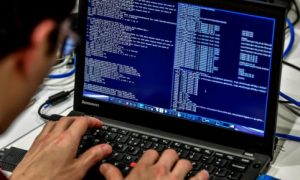 On Thursday, Russia was blamed by the United Kingdom for a 2017 cyberattack. The British publicly pointed their finger at Moscow for the spreading of a virus that disrupted businesses across much of Europe including Reckitt Benckiser in the UK.
On Thursday, Russia was blamed by the United Kingdom for a 2017 cyberattack. The British publicly pointed their finger at Moscow for the spreading of a virus that disrupted businesses across much of Europe including Reckitt Benckiser in the UK.
Russia has denied the UK accusation saying it was a “Russophobic” campaign that was being waged by countries in the West.
The NotPetya attack during June began in the Ukraine where business and government computers became crippled then spread across the globe, stopping operations at factories, offices and ports.
The statement added that the attack had masqueraded itself as a criminal enterprise however its purpose in principal was to just disrupt.
The primary targets were the governmental, energy and financial sector in Ukraine, but its indiscriminate design helped it to spread affecting other Russian and European business.
Moscow previously denied that it was behind the attack, and Thursday a spokesperson from the Kremlin categorically denied all the allegations it was behind the attack.
The spokesperson added that the country considers the allegations as groundless and were nothing more than the continuation of the “Russophobic” campaign being waged against the country without have any proof.
Reckitt, a maker of consumer goods, and AP Moller-Maersk a shipping company based in Denmark were amongst the most affected, with a cost for the attack estimated to be in the hundreds of millions of pounds.
Gavin Williamson the defense minister in Britain said the cyberattack had been part of new form of warfare and the country must be ready to make a response.
Britain recently has become much more vocal over the threat Russia poses during a time when some Conservative Party members, which is the ruling party, have expressed a big concern over the impacts being felt from the cut in spending for defense.
Last November, Theresa May, the British Prime Minister accused the government of Russia in meddling with the country’s elections as well as planting fake news stories in local media.
The Russian government has also been accused of trying to impact the outcome of the 2017 U.S. elections through using social media to reach millions of voters.
